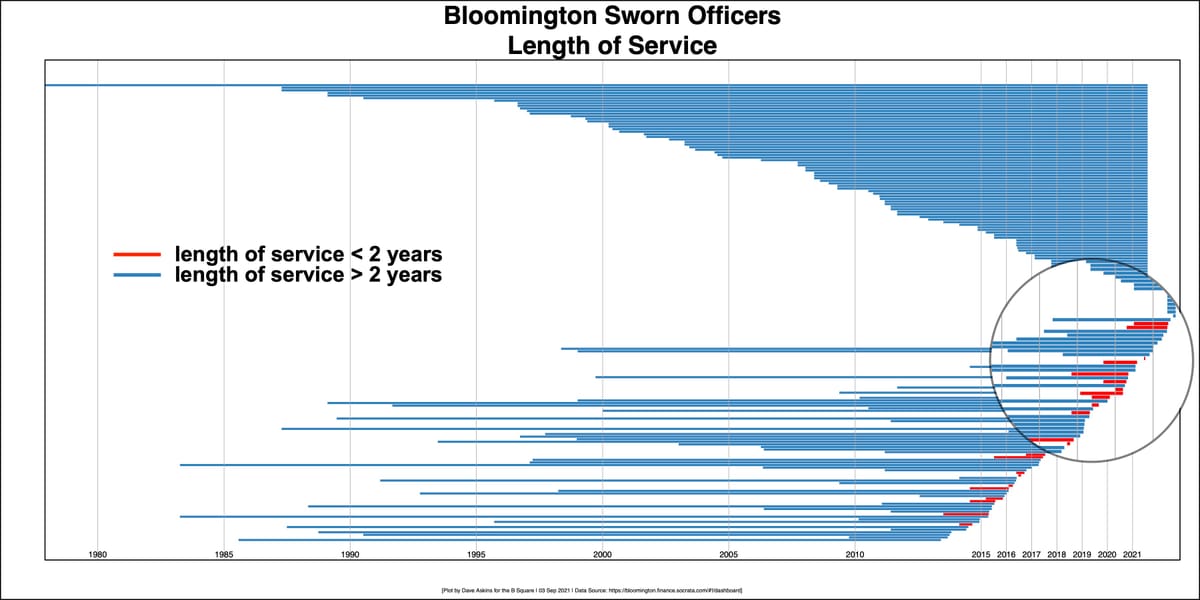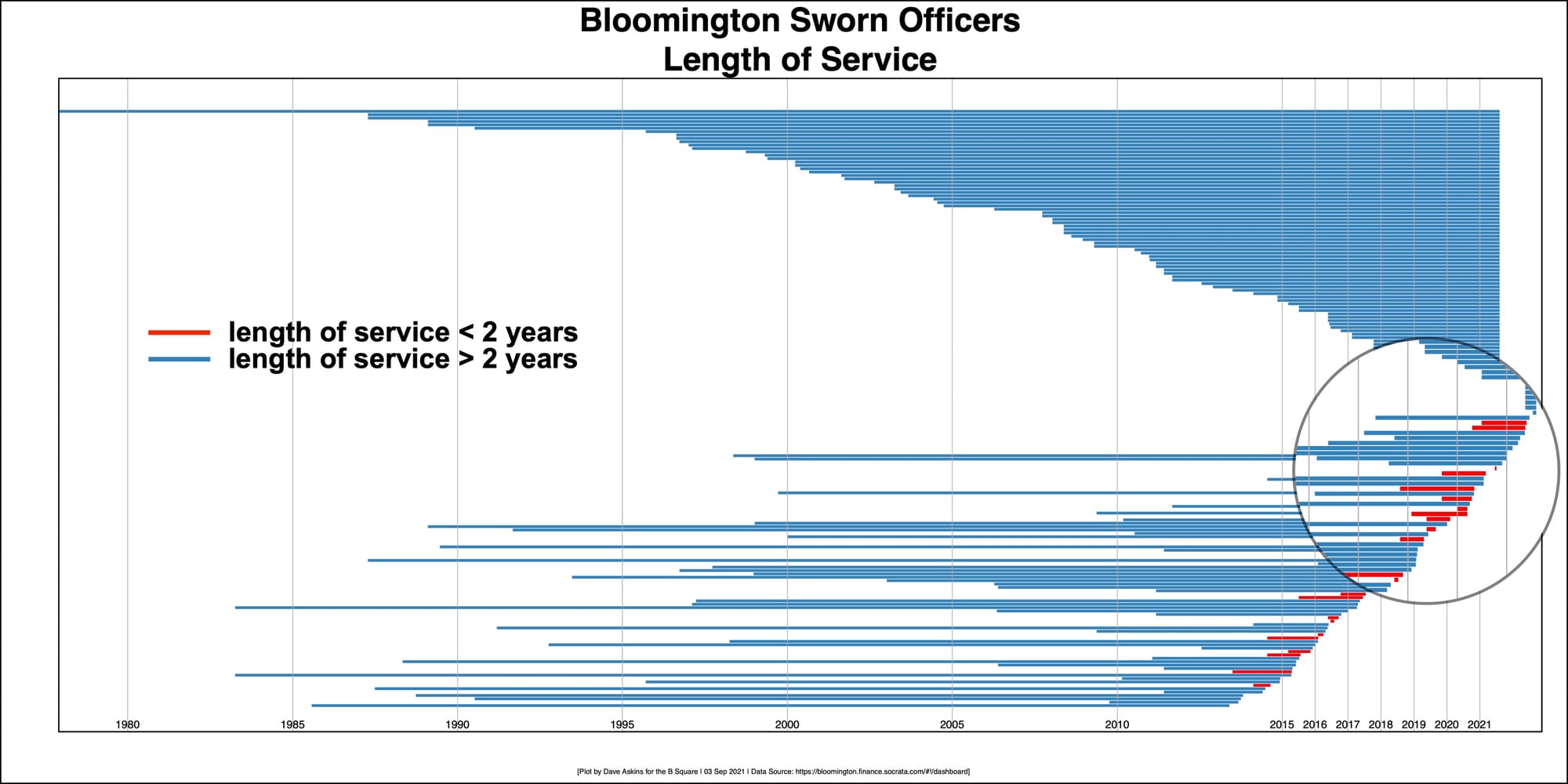Resolution supporting $5K more for Bloomington police gets OK from city council



A resolution that expresses support for revising the current collective bargaining agreement with the police union, to increase sworn officer pay by $5,000, was approved by Bloomington’s city council at a special meeting on Wednesday.
The vote was 7–1–1.
Dissenting on the vote were Matt Flaherty, who voted against the resolution, and Kate Rosenbarger, who abstained from the vote after participating in deliberations.
Spurring the resolution, which was sponsored by Dave Rollo, Susan Sandberg, and Ron Smith, are Bloomington police department’s (BPD’s) challenges with recruitment and retention.
Two recent resignations have dropped the number of sworn officers to 91, out of 105 that are authorized. The proposed 2022 budget provides funding for 105 sworn officers.
BPD’s union, FOP Lodge 88, has provided certified salary amounts to the state’s police pension fund for comparisons that show Bloomington ranks 68th out of 153 departments in the state.
Sandberg said at Wednesday’s meeting, “We should have been doing more to retain officers. And our failure to keep pace with competitive salaries has brought us to this critical point where action is needed now.”
Around 5:30 p.m. on Wednesday, about an hour before the city council’s Wednesday sessions started, a joint statement on the resolution was issued by Bloomington mayor John Hamilton and police chief Mike Diekhoff. The statement essentially opposed the resolution.
In the statement, Hamilton and Diekhoff discouraged the idea of re-opening the collective bargaining process to change salaries for 2022. The current contract expires at the end of 2022. Instead, they proposed starting the negotiations on the new contract a few months earlier than they would ordinarily start.
“Normal union contract negotiations would begin in early 2022, but we appreciate the urgency and propose that negotiations begin next month,” the joint statement said.
The joint statement from Hamilton and Diekhoff also increased the recruitment and retention pool for BPD, which is already proposed in the 2022 budget, from $250,000 to $500,000. The new amount would work out to roughly $5,000 per officer.
Flaherty voted against the resolution, because he thinks the resolution steps on the collective bargaining process as described in Bloomington’s city code. That was in line with a sentiment conveyed by corporation counsel Philippa Guthrie at a work session last Friday, when she said, “This is in some ways the council taking over the bargaining process.”
The city code outlines a collective bargaining process and describes it as “the exclusive mechanism by which the city, the Fraternal Order of Police, and the employees in the bargaining unit shall carry out collective bargaining.”
Flaherty also stated, “I think where this resolution loses me is that I really just don’t think it’s our role to specify salary levels of city employees.”
Rosenbarger abstained from the vote saying, “I don’t feel like I have the right amount of data here to have done proper due diligence to really decide yes or no.”
At Wednesday’s meeting, city attorney Mike Rouker gave remarks to the council on the topic of BPD compensation. He said extra compensation received by BPD officers included up to $4,800 of pay for specialty certification, education and training and an additional $1,600 for an annual clothing allowance.
Rouker was also critical of reference to the list of certified salaries, used by the FOP and councilmembers to compare BPD with other departments, as a “list of salaries.” “I don’t even think the pension rate list should be described as a list of salaries. I think that is just inaccurate.” The certified amounts do not necessarily reflect the amounts of compensation being paid to active officers, Rouker said.
Rouker showed a chart listing 16 different police departments in the state compared by their certified pension fund amounts where Bloomington ranked 16th out of 16. A different table, which he called “an actual salary comparison,” showed Bloomington ranking 12th out of 16.
About the second table, Rouker said, “It still cannot present a full picture of comparable police compensation from city to city, but it is at least a comparison of base salaries of similarly situated employees rather than a list of pension rates.”
SELF-REPORTED OFFICER FIRST CLASS PENSION RATES
Self-Reported PERF Pension Amount (City of Bloomington Slide)
| City | Amount | |
| 1 | Carmel | $81,571 |
| 2 | Indianapolis | $81,561 |
| 3 | Munster | $75,112 |
| 4 | Fishers | $74,299 |
| 5 | Noblesville | $71,498 |
| 6 | Lafayette | $70,759 |
| 7 | Westfield | $70,503 |
| 8 | Valparaiso | $69,036 |
| 9 | Evansville | $69,012 |
| 10 | South Bend | $67,608 |
| 11 | Columbus | $64,460 |
| 12 | Plainfield | $63,360 |
| 13 | Terre Haute | $63,007 |
| 14 | West Lafayette | $62,754 |
| 15 | Kokomo | $62,744 |
| 16 | Bloomington | $59,456 |
BASE SALARIES OF FIRST-YEAR OFFICERS (City of Bloomington slide)
| City | Amount | |
| 1 | Indianapolis | $75,171 |
| 2 | Carmel | $71,135 |
| 3 | Westfield | $68,481 |
| 4 | South Bend | $63,358 |
| 5 | West Lafayette | $60,009 |
| 6 | Lafayette | $59,447 |
| 7 | Kokomo | $59,444 |
| 8 | Munster | $58,136 |
| 9 | Fishers | $57,932 |
| 10 | Plainfield | $57,161 |
| 11 | Evansville | $57,131 |
| 12 | Bloomington | $56,956 |
| 13 | Noblesville | $56,576 |
| 14 | Columbus | $53,716 |
| 15 | Valparaiso | $50,405 |
| 16 | Terre Haute | $49,943 |
2022 Budget Process
The resolution approved by the city council on Wednesday does not bind the administration to do anything. That’s one reason some councilmembers gave for not considering the resolution to be interfering with the collective bargaining process.
Where does the resolution fit in the budget process?
In the last week of August, the city council received departmental presentations on the 2022 budget.
The final budget legislation is set to be introduced on Sept. 29 with an accompanying public hearing. That means the proposed budget has to be uploaded to the state’s website by Sept. 19, because that step has to be completed at least 10 days in advance of the public hearing.
Final action by the council on the budget is set for October 13.




Comments ()